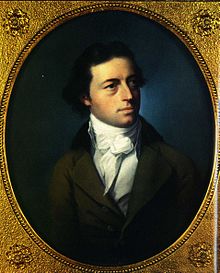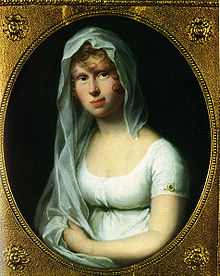Friedrich Vieweg
Johann Friedrich Vieweg (born March 11, 1761 in Halle (Saale) ; † December 25, 1835 in Braunschweig ) was a German publisher and founder of Vieweg Verlag .
Youth and apprenticeship
Friedrich Vieweg was born as the son of master tailor Johann Valentin Vieweg († 1785), who later owned a starch factory, and his wife Johanne Sophie, b. Bechbach († 1785), born in Halle an der Saale. The father came from a poor background and grew up in the orphanage in Halle. Friedrich Vieweg's older brother Johann Gottfried Vieweg became a pastor in Sargstedt and his younger brother also became a pastor. Vieweg attended the Latin School of the Orphanage Foundation in Halle and then the grammar school. Contrary to his parents' wishes, he felt no inclination to study theology.
After breaking off a commercial apprenticeship in Magdeburg , the acquaintance of Friedrich Nicolai prompted him to do a book trade apprenticeship in the Halle orphanage bookstore. He then worked as an assistant in the Bohn bookstore in Hamburg , where he met the philanthropist, educator and writer (later publisher) Joachim Heinrich Campe and his daughter Charlotte, his future wife, among others .
Foundation of the publishing house in Berlin
Friedrich Vieweg represented the bookseller Mylius in Berlin in 1784 due to illness and closed his bookstore after his death. He then founded his own publishing business here in 1786, which developed very favorably. His most famous publishing work was Goethe's lyrical epic Hermann and Dorothea . Campe's “Robinson the Younger” soon appeared in Viewegs Verlag and was still a popular article 100 years later. Friedrich von der Trenck's biography was also an early success . Right from the start he published the writings of the free-spirited theologian Carl Friedrich Bahrdt and the educational-theological writings of his brother Johann Gottfried.
In the 1780s and 1790s there was also a publisher in Berlin, Wilhelm Vieweg (or Friedrich Wilhelm Vieweg, born 1765, book and paper dealer), called the Younger, while Friedrich Vieweg added the elder from 1787 to himself distinguish. It is unknown if they were related, but they were certainly not brothers and the publishers had nothing to do with each other.
Activity in Braunschweig

On October 17, 1795, Vieweg married Campes only daughter Charlotte (the "Lotte" in Robinson). Campe was now living in Braunschweig , which Duke Karl Wilhelm Ferdinand wanted to make the center of the German book trade by founding a bookselling fair and exchange. Since Vieweg made some suggestions, he moved to Braunschweig in the spring of 1799 at the request of the Duke. The Duke supported him in this, among other things, by giving him the property of the dilapidated theater for today's Vieweghaus on Burgplatz .
Vieweg also bought Campe's school bookstore, which he founded in 1786 by purchasing the orphanage bookstore, and around Pentecost 1799 the printing works of Ernst Wilhelm Gottlieb Kircher, who moved to Goslar. After the Duke was driven out, the publishing business of Vieweg, who was suspected of being a “favorite”, suffered during the Napoleonic era, and he concentrated on expanding the printing works to include a type foundry and a playing card factory. He also attached great importance to high typographic quality and set himself apart from the competition.
Friedrich Vieweg made use of the new political freedoms and was involved in the city administration already under Westphalian rule . Despite a few suspicions and accusations, he later worked in the local community, including as a city councilor, and his publishing business also developed favorably. In 1824 he planned a patriotic weekly publication ("Braunschweigische Hauschronik"), which then did not materialize, and from January 1826 to 1828 he published the "Mitternachtblatt für educated estates" under Adolf Müllner , which was transferred to Niedmann's Verlag in Wolfenbüttel due to differences of opinion .
Death and succession

Friedrich Vieweg died on December 25, 1835 at the age of 74, his wife Charlotte the year before on July 22, 1834.
The publishing bookstore Friedrich Vieweg und Sohn passed to the eldest son Eduard Vieweg (1797–1869), who had been a partner since 1825. Friedrich Vieweg junior (1808–1888) founded his own publishing bookstore in Paris in 1837 , and one of the daughters, Blanca, married the publishing bookseller George Westermann .
literature
- Paul Zimmermann : Vieweg . In: Allgemeine Deutsche Biographie (ADB). Volume 39, Duncker & Humblot, Leipzig 1895, pp. 689-693.
- Rudolf Schmidt: German bookseller. German book printer. Contributions to a company history of the German book industry. Volume 6: Verlag der Buchdruckerei Franz Weber (later: Eberswalde: Verlag von Rudolf Schmidt), Berlin 1908, pp. 983–986. [1]
- Meyer's Large Conversation Lexicon. Volume 20, Leipzig 1909, p. 157.
Individual evidence
- ↑ Uta Motschmann (Ed.), Handbuch der Berliner Vereine und Gesellschaft 1786–1815, Berlin, De Gruyter 2015. There listed as a member of the Freemasons, as well as the bookseller Johann Friedrich Vieweg (born 1738), (Johannes) Friedrich Vieweg himself and the war council Karl Friedrich Vieweg .
- ^ Friedrich Vieweg and son. Braunschweig 1786-1911. Published on the occasion of the hundred and twenty-five years of existence of the company , Vieweg, Braunschweig 1911, p. VII
| personal data | |
|---|---|
| SURNAME | Vieweg, Friedrich |
| ALTERNATIVE NAMES | Vieweg, Johann Friedrich; Vieweg, Johannes Friedrich |
| BRIEF DESCRIPTION | German publisher |
| DATE OF BIRTH | March 11, 1761 |
| PLACE OF BIRTH | Halle (Saale) |
| DATE OF DEATH | December 25, 1835 |
| Place of death | Braunschweig |

